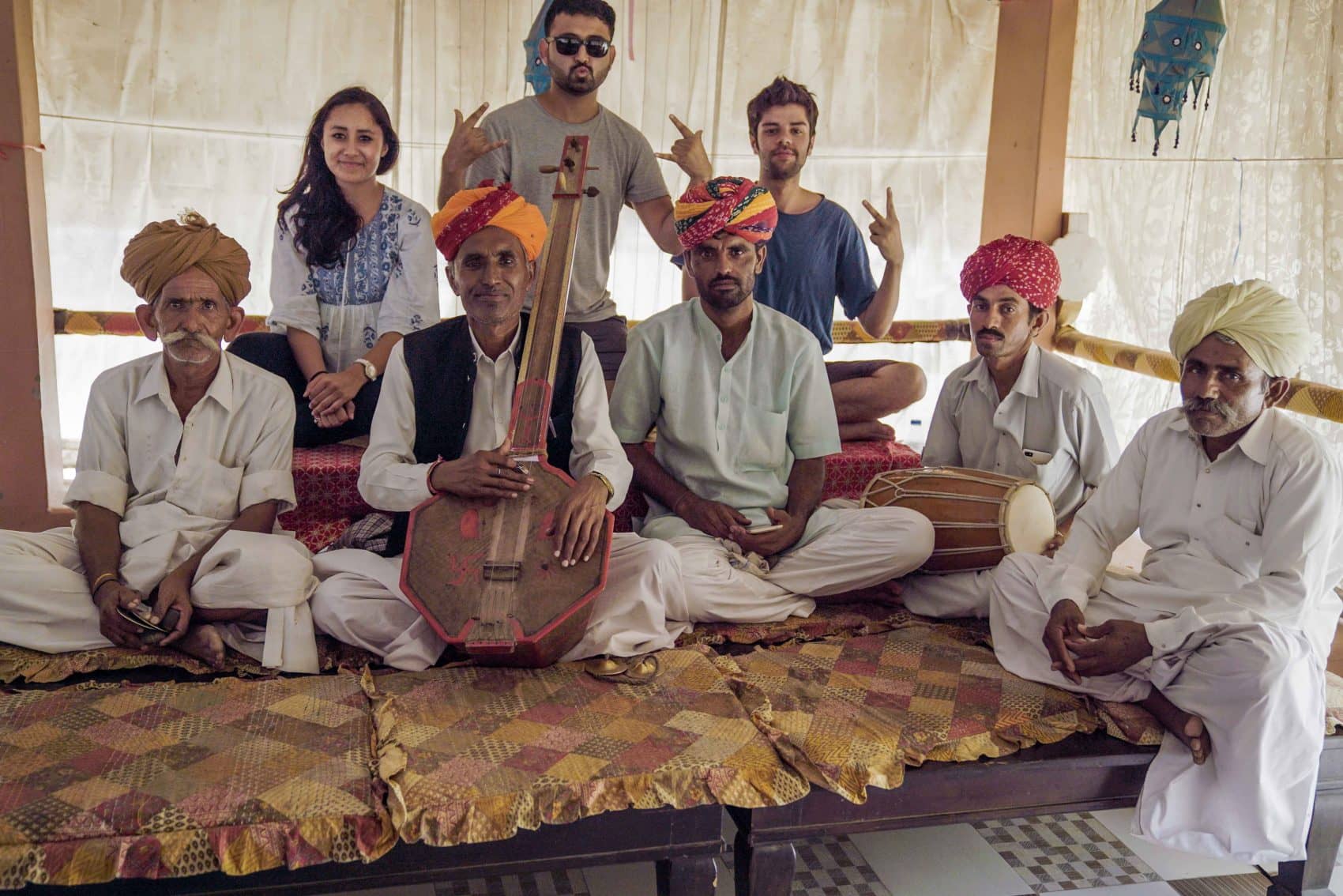
RECITING POWER OF FOLK MUSIC
“Music is the easiest method of meditation. Whoever can let himself dissolve into music has no need to seek anything else to dissolve into.” – Osho
Shridhar is from an almost medieval village named Bhadresh, Barmer seems to share and live by similar sentiments. He is 48 years old and belongs to the Meghwal community of Rajasthan. True to what Meghwals are known for, Shridhar with his group aspires to popularize devotional folk music throughout India.
He was born into a family of singers who has been reciting devotional songs for more than three generations now. His singing style too is inspired by his grandfather and father who he says has been a source of motivation throughout his career. With no proper training institutes and almost negligible assistance, his chances of taking up music as a profession were thin. But the paucity of resources could not make him give up his passion. He started by listening to others in Satsangs. Curious as most children are, he would ask elders in his family and society to explain the meaning of the verses. “ I would write down songs with their meanings and try to take in all the values that they imparted. This was essential to connect with my art. Once I got the clarity I could then sing them in my own style.”
Devotional songs or bhajans are sung in specific ragas. A musical note or raga has its own distinct effect and is related specifically to a mood or time of the day. The sacred hymns are sung in adoration of a God. Most of the bhajans recited by Shridhar and his group members are about local deities like Ramdev and saints and seers like Ravidas, Surdas and Meerabai. However, God-realization is not the only aim of singing bhajans. It offers other advantages too. Bhajans and prayers awaken positive vibrations in oneself and in the environment. Bhajans and prayers remove the feeling of animosity or envy that one might have and replaces it with contentment. Through prayer, the devotee begins contemplating. When one sings bhajans and reiterates divine qualities, these qualities take root in the heart, creating an awakening in real life.
harak-harak gun gaya
Let us sing with joy and enthusiasm, the tales of the miracles of God
re vaalena baadava
Wise Guru, you are most welcome, to enlighten us
harak-harak jass gaavaa
And sing with joy and enthusiasm, the tales of the miracles of God
re vaalena baadava
Wise Guru, you are most welcome, to enlighten us
As he takes his seat among his fellow group members, he looks rejuvenated. He starts to sing and the scorching heat of the desert can no longer disturb his equilibrium, it is almost like a saint meditating. Bagga Ram seated beside him, though much older, shows no signs of fatigue himself. Instead, he says that music especially devotional music is a great energizer. With his manjira in his hands, he is a perfect figure of dedication and submission to God. For him, it is a way of expressing gratitude for everything that God has blessed them with.
Shridhar, however, is uncertain about the future. As he tries to introduce his kids to folk music, he has to face a dilemma. His children, despite having the talent and interest to be folk musicians after him, are dissuaded by the lack of opportunities in the music industry where young people today prefer Western beats over the rhythms and tune of ancient couplets and verses. Shridhar with his group has himself been called for a recording for the first time. “Unlike those folk musicians who have thrived under royal patronage, we have to hustle more. But as long as there is hope for the survival of our art form, we will continue singing.”
aaj humare guru aangan aaya
Our Guru has come to our home today
aaj humare guru aangan aaya
Our Guru has come to our home today
ayasohe mann bhaya
The arrival of the Guru fills my heart with happiness
re vaalena baddava aaya
My Guru, my lord, I welcome you wholeheartedly
Shridhar and his group get to perform in about 10-15 events in their village in a month. Their charges per event vary according to the financial condition of their patrons and hosts and there are times when they readily perform for free. When asked why he says that God is the only giver, they have faith in him and their music that they will fare well in the long run and get recognition.
He wants to build a culture where people are able to identify themselves with their traditions. One should not be forced to take up a profession in folk music. They should show interest on their own and should be eager to understand and adopt the values that make them who they are. It is important for everyone to know their roots because If you do not know where you are coming from you will never appreciate where you are going.
